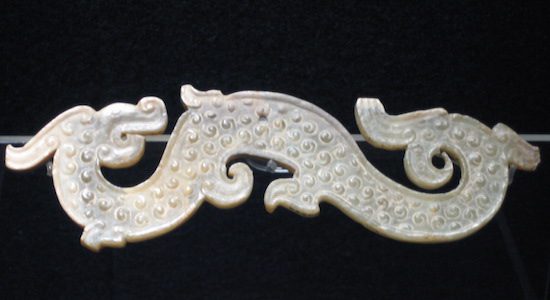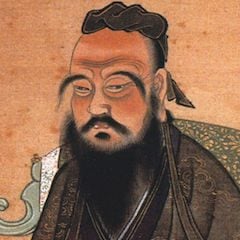
| By Dale McGowan |
China has always been one of the most receptive cultures on Earth for atheism. Nontheistic ideas have been front and center in Chinese philosophy and national government for most of its long history.
Even religion in China often does fine without gods, including some forms of Buddhism and Taoism. And Confucianism, a secular philosophy focused on reason and natural ethics rather than gods, has been the greatest influence on Chinese thought for more than 2,500 years.
So a brilliant, continuous line of atheist thought emerges from Chinese history, valued and preserved in its original written form, not filtered through the writing of religious critics.
But if you read English translations of Chinese philosophy, you can easily get a different impression: They seem to spend a lot of time and thought on heaven.
Understanding t’ien
Chinese philosophers spent a great deal of time and thought on the concept of t’ien (or tian), which translates loosely as “heaven.” But t’ien has no connection to the traditional Western idea of a place for human souls to commune with a deity after death. Instead, t’ien means, “that which causes the world to be as it is.”
That falls into a lexical gap in English — a useful concept that doesn’t quite have a word of its own, like staring blankly into the middle distance (Japanese boketto) or a joke so bad you feel compelled to laugh anyway (Indonesian jayus).

Philosophers in China who considered a deity to be the cause of everything used t’ien to denote that deity, while philosophers who saw only natural causes at work used the same word to mean comprehensible natural laws. Whatever it is that makes the world as it is, that’s t’ien.
Two of the most famous nontheistic philosophers in ancient China were Xun Zi (312–230 BCE) and Mencius (372–289 BCE). They disagreed on human nature — Xun Zi felt that humans are basically bad, but improvable by education and discipline, while Mencius felt humans are basically good, but led astray by social influence. But they did agree that t’ien had nothing to do with a conscious god, seeing it instead as the sum of natural causes, many of which are predictable.
Xun Zi sounded like an atheist blogger:
Pray all you want — heaven can’t hear you. It’s not going to stop the winter because you are cold, and it’s not going to make the Earth smaller because you don’t want to walk so far.
You pray for rain and it rains, but your prayer has nothing to do with it. Sometimes you don’t pray for rain and it rains anyway. What do you say then? If you act wisely, good things tend to happen. Act like a fool and bad things tend to happen. Don’t thank or curse heaven — it’s just the natural result of your own actions.
If you want to have a better life, educate yourself and think carefully about the consequences of your actions.
Sounds like humanism.
Then there’s Confucius

Confucianism is a secular system of philosophy and ethics, an approach to life that encourages self-improvement and the cultivation of virtue, including altruism and compassionate action to help others achieve a better life. And it does it all without appealing to gods for help.
Confucius is credited with coining the earliest version of the Golden Rule: “What you do not wish for yourself, do not do to others” — one of countless variations of that ethical principle found in cultures around the world.
Whether Confucianism is a philosophy or a religion is a source of perpetual and mostly pointless debate. You can call it either one.
But even if you consider it a religion, it is (like Jainism and some forms of Buddhism) a nontheistic one.
If the chaotic collision of philosophies was their idea of a good time, Mencius and Xun Zi picked an especially good era in which to be born, in a period called the Hundred Schools of Thought. It was a kind of Golden Age for Chinese philosophy, with countless new and different ideas contending for the hearts and minds of the Chinese.
This battlefield of ideas coincided with a lot of literal violence — in this case, the military clashes that would eventually turn China from countless tiny states into seven big warring states and finally into a unified nation.
People enduring a period of chaos and uncertainty are naturally thirsty for order and compassion and a system of ethics that describes a reasonable path back to civilized behavior. So it’s not surprising that Confucianism, a system of thought that stresses exactly those qualities, emerged as the clear winner in the war of ideas, forming the backbone of Chinese culture and thinking for more than two millennia.
Adapted from Atheism for Dummies by Dale McGowan.
DALE McGOWAN is the author of many books from the nonreligious perspective. He was Harvard Humanist of the Year in 2008 and founded the humanist charity Foundation Beyond Belief in 2010.
He is now Content Development Editor and Atheist Channel manager for Patheos. He lives in Atlanta.















